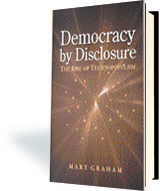Policy Brief
The Political Economy of Transparency: What Makes Disclosure Policies Sustainable?

Archon Fung, David Weil, Mary Graham and Elena Fagotto, December 2002
This paper explores the dynamics of transparency. It asks why some government-created systems improve over time while others stagnate or degenerate into costly paperwork exercises. As products of the political process, transparency policies inevitably begin as unlikely compromises. Though transparency is universally admired in principle, its particular applications frequently conflict with other societal values or powerful political interests. Disclosing information can clash with efforts to protect public safety and proprietary information, to guard personal privacy, or to limit regulatory burdens. It can also clash with the central economic and political objectives of target organizations that may view such disclosure as a threat to reputation, markets or political influence. At the same time, the benefits of disclosure are often diffuse. Beneficiaries may be consumers, investors, employees, and community residents. Such users are rarely organized to support and oversee transparency systems.



